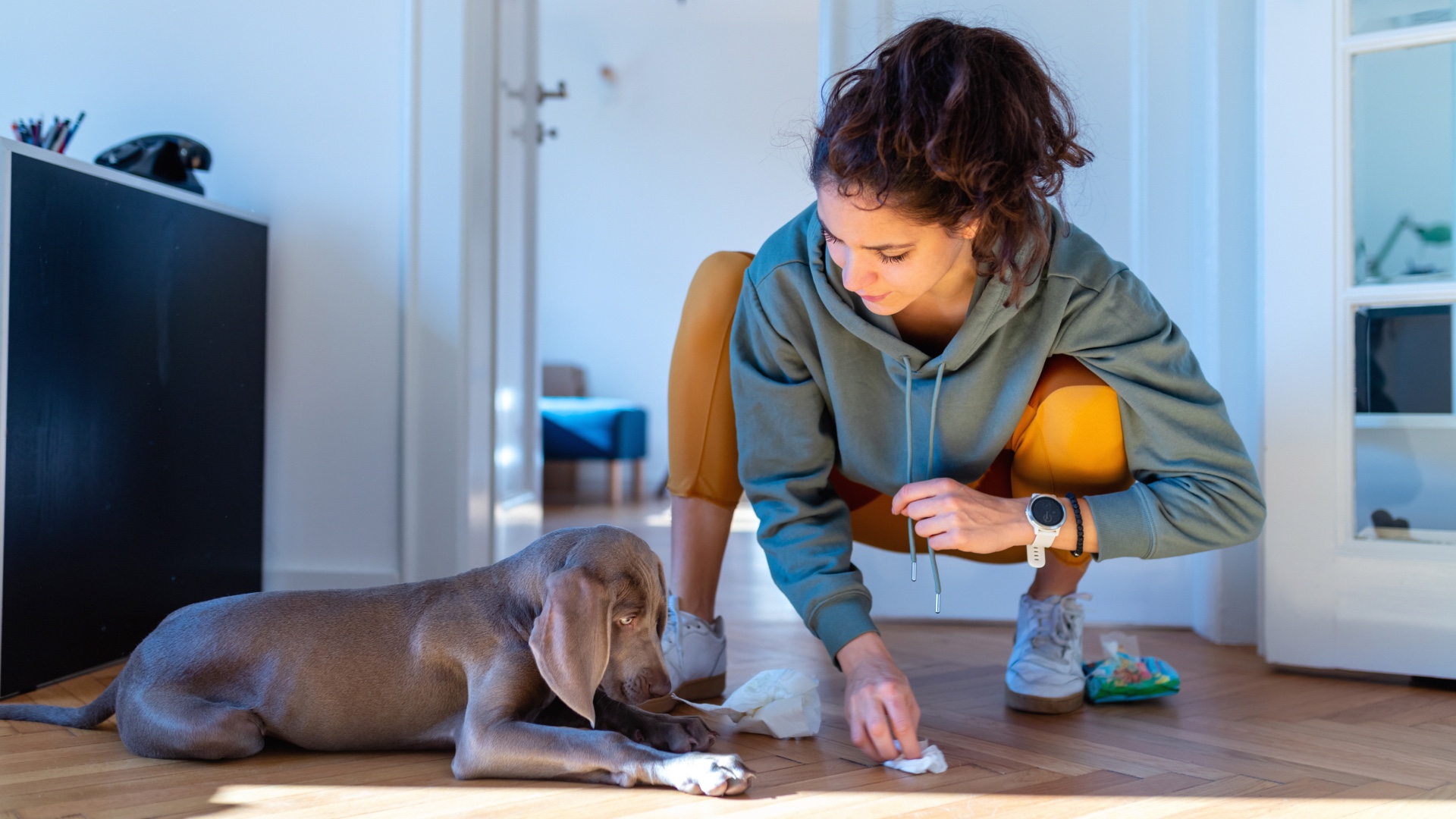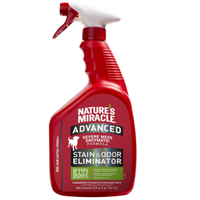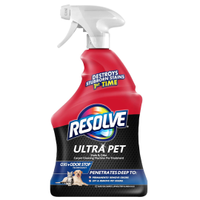How to get dog pee out of the carpet and floors (it's easier than you might think!)
Wondering how to get dog pee out of the carpet and floors? This vet’s four-step process has got you covered.

Whether you’re a new or experienced dog owner, how to get dog pee out of the carpet is a question you’ve likely found yourself asking on at least one occasion. There’s nothing worse than discovering your pup has decided to go to the toilet on your carpet, floors or brand new rug, but the good news is getting rid of the stain and odor is easier than you might think.
When it comes to potty training a puppy or older canine, the best dog treats can come in handy, however it’s not unusual for dogs to go through periods of regression due to illness, stress, anxiety or simply being left home alone for too long without a bathroom break.
The answer to how long does it take to potty train a dog varies but by one year of age, most pups should be fully toilet-trained. However, accidents can still occur from time to time (if they’re happening frequently it’s best to consult a vet) and when they do, knowing how to clean up the mess quickly will prevent stains and odors from becoming embedded in your carpets and floors.
With that in mind, we sought the advice of Dr. Hannah Godfrey who shared her four-step process for getting dog pee out of the carpet. Plus, she revealed her top tip for preventing future accidents. Let’s dive in…
How to get dog pee out of the carpet
Even if you've read all the tips for training your dog on your own, accidents can still happen. When they do, it's good to have a go-to formula that you can fall back on that's guaranteed to rid your carpets and floors of stains and smells. Here's what Dr. Godfrey recommends:
1. Dry the carpet
First, make sure you put on gloves and grab some cleaning supplies like a dish sponge, toothbrush, or towel. If the area your dog urinated on is still wet, dab it with a clean and dry towel in order to soak up any excess moisture. "If you can do this as soon as possible, this will help make the rest of the process as effective as possible," says Dr. Godfrey.
2. Apply a vinegar-based solution
"Always patch-test your carpet first, but a diluted white vinegar solution will help to counteract the urine smell," Dr. Godfrey advises.
When it comes to making a vinegar-based solution, you'll be relived to hear it's very straightforward. Simply mix one part vinegar to one part water in a container and pour over the affected area. Lightly scrub the spot being careful not to scrub too hard as you don't want to push the stain and odor further into the fibres. Once you've done that, leave the spot to dry completely.
For dry urine spots (in other words, accidents that you've discovered later), you may need to repeat this process more than once.
3. Sprinkle over baking soda
Vinegar will help with reducing the stain, while baking soda will help remove the smell. Let baking soda sit for at least 15 minutes, but make sure it stays longer for any set-in orders. You can even let it sit overnight to help with really persistent odors.
"Applying baking soda will absorb the urine and neutralize the odor," confirms Dr. Godfrey, "just leave it for as long as you can – ideally 12 to 24 hours."
4. Vacuum the area
Once the area you've treated is completely dry, vacuum the carpet to remove any of the excess baking soda. This will help you see if you got the stain out completely. If you find the stain is still there, you can re-treat the stain with the steps taken above, or try a new approach: a mix of one part water, one part hydrogen peroxide, and a small amount of dish detergent over more baking soda. Then gently scrub. Jut be sure to do a patch test on a small piece of carpet first to make sure the hydrogen peroxide doesn't bleach the color out of it.
Does dog urine smell ever go away?

There aren't many things to hate about being a dog owner, but having a lingering urine smell in your home is certainly one of them.
A good reason to get dog urine out of the carpet as soon as you can is that the smell can last for a long time if it's settled in. The unpleasant stench can linger for months if not treated properly, and if it's an especially fluffy carpet that smell can really settle into the fibers. Plus ammonia fumes can irritate your noise, throat, and lungs, so it can be especially irritating for asthma sufferers.
"If you act quickly and use the steps above, the urine smell should be gone by the end of the process (around a day)," explains Dr. Godfrey. "However, if the urine isn’t fresh or there have been lots of accidents over a longer period, you might need to repeat the process a few times, open the windows for ventilation, and use plenty of air fresheners. Sadly, if the urine has penetrated deep into the fibers and hasn’t been cleaned straight away, you may find replacing the carpet the better solution."
How to get rid of the smell of dog urine
"Using air fresheners, diluted white vinegar and baking soda should all help to get rid of the smell of dog urine," says Dr. Godfrey. "However, these methods are most successful if you act soon after the accident occurred before the urine has dried."
If you try all of these remedies and want to give something else a go, there are some products you can buy. Here are two of our favorites:
Nature's Miracle Advanced Dog Stain and Odor Eliminator Spray
This powerful enzymatic formula will remove even the toughest dog stains and smells from your carpet, floors, furniture, fabrics and more.
Resolve Ultra Pet Odor and Stain Remover Spray
Great for use on carpets, upholstery and rugs, this powerful stain penetrates deep to lift and remove pet stains and prevent resoiling.
How to get dog pee out of floors

Let's say you've solved the urine-in-the-carpet issue, but your pooch has either had accidents on your hardwood floor or it leaked through the carpet onto the hardwood. Don't fret, there are ways to get that stain out before you have to call the professionals. Try spraying hydrogen peroxide on the stained areas, then cover them with a piece of cloth or paper towel soaked in more hydrogen peroxide for around 15-20 minutes, then clean your for as you would usually. If this doesn't help, you may need to get a professional cleaning and polishing.
How to prevent future accidents
Frequent accidents can be challenging to deal with, so we asked Dr. Godfrey for her top tips on how to prevent your dog from peeing on the carpets or floors. Here's what she had to say:
"If your dog is having wet accidents around the house, discovering the reason will help to determine what’s best to do about it. For instance, if they’re just not having regular enough toilet breaks, consider having a neighbor or dog walker come in during the day to let them out. If they’re passing urine because they’re anxious or afraid, it’s worth speaking to your vet and a qualified veterinary behaviorist. If they seem to be incontinent, there could be medication to help. Whatever the cause, it’s a good idea to book in to see your vet and bring a urine sample, to check there’s no medical reason behind their regular accidents."
For new fur friends that you've just welcomed into your family who may not yet be toilet trained check out our guides to how to potty train a puppy and how to potty train an older dog.

Dr Hannah Godfrey studied Veterinary Medicine at the Royal Veterinary College London. After graduating in 2011, Dr Godfrey went on to become a veterinary surgeon, conducting surgery consultations on a range of animals at a small independent practice in Cardiff, South Wales, UK. Dr Godfrey has a strong interest in soft tissue surgery. When she’s not helping animals back on their feet, Dr Godfrey writes a number of veterinary and animal-focused articles.
PetsRadar Newsletter
Get the best advice, tips and top tech for your beloved Pets

Kathryn is a freelance writer who has been a member of the PetsRadar family since it launched in 2020. Highly experienced in her field, she's driven by a desire to provide pet parents with accurate, timely, and informative content that enables them to provide their fur friends with everything they need to thrive. Kathryn works closely with vets and trainers to ensure all articles offer the most up-to-date information across a range of pet-related fields, from insights into health and behavior issues to tips on products and training. When she’s not busy crafting the perfect sentence for her features, buying guides and news pieces, she can be found hanging out with her family (which includes one super sassy cat), drinking copious amounts of Jasmine tea and reading all the books.


